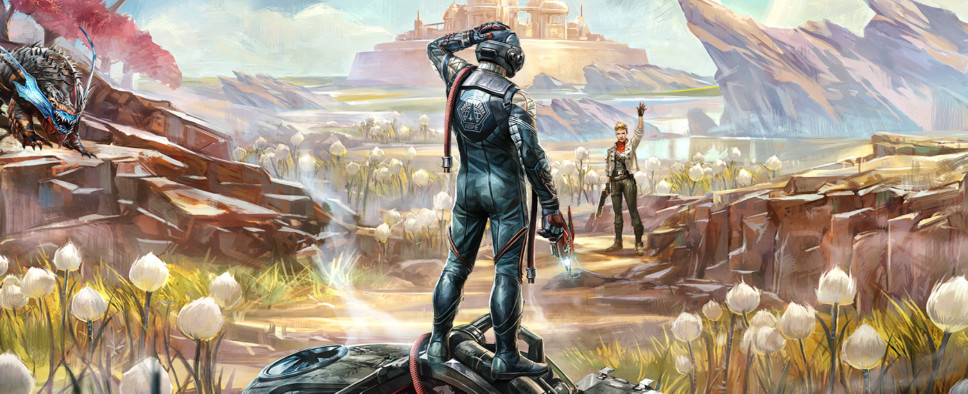The Outer Worlds Review - Page 3
-
Category: ReviewsHits: 14382

Article Index
And yet for all that railroading, your character isn’t defined at all, has no personal ties or agenda, and is just a vessel for chaos. And this is doubly unfortunate, as during the final stretch things do start to pick up. A semblance of a story lifts its head. You even get a couple of would-be antagonists in the last few hours.
You also get to actually visit your ship and learn its story. And it’s actually quite engaging. Was it really so hard to put this section at the beginning of the game? You know, to anchor your character to the world? Maybe give him a background and some people he cares about? Stakes, structure, that sort of thing?
Instead, as soon as the game starts picking up steam and presents you with some intriguing mysteries, it ends, leaving you confused and a bit angry. But hey, at least the ending slides are fairly satisfying, there are plenty of puns and references, and no sign of romances, so it’s not all bad I guess.
Good + 2 = ???
Now that I’ve taken a break to purge my mind from its futile attempts to understand how The Outer World’s story could have escaped the first draft stage, let’s talk about the game’s roleplaying system.
As most RPGs do, The Outer Worlds begins with you creating a character. First things first, you need to distribute some attribute points. But, as opposed to some simple and easy-to-understand system, like Fallout's SPECIAL, you have to deal with someone's poor attempt to simplify the wheel by strapping a nuclear reactor to it.
You see, your attributes don't have numerical values and instead, they go as listed: Below Average, Average, Good, High, Very High. But in order to manipulate them, you will be using numbers. So, for example, if you add 2 stat points to Average, you get High in The Outer Worlds. Why High and not Good or any other positive adjective for that matter? Don’t ask me, just make your peace with this non-Euclidean character building.
Now, the fun part about The Outer Worlds’ attributes is when you put them at Below Average, your character gets a unique penalty, like not being able to regenerate health. Just so we’re clear - this is a great idea. As opposed to the terrible idea of combining random words with numbers. Ideally, a team of gainfully employed developers would have someone to differentiate between the two, but apparently, we don’t live in a perfect world.
The skill system follows a similar pattern, where skills are separated into groups, and up to a certain point, your skill points improve the whole group, but after a while, you have to choose which skills to specialize in. As you improve your skills, you get passive numerical bonuses and upon reaching certain skill thresholds, you unlock additional abilities, like sneak attacks or extra limb damage and status effects.
But then some of those bonuses are borderline useless, the game doesn’t have enough skill checks to encourage specializing, and as a cherry on top, you can be pretty good at most things without investing any skill points at all.
I played the game on Hard, the third of the game’s four difficulties, with the final one being more annoying than anything else on account of it limiting your saving options. And my character was this scientist type with terrible physical attributes and nothing invested into weapon skills.
In the end, this very surprisingly ended up being a very strong combat-oriented build thanks to some ridiculously overpowered perks and science weapons, but before I got there, I used all sorts of conventional guns. And even then, there wasn’t a problem in The Outer Worlds I couldn’t solve by backpedaling while holding the left mouse button.
When creating a character, you also pick an aptitude, only instead of Arcanum’s playthrough-defining backgrounds, these don’t really do anything worth mentioning. They’re just there to give you another thing to click during character creation.
Later on, every two levels you’ll get a perk point. There are three tiers of perks in the game, with sixteen perks in each tier. You need to invest five points to unlock the second tier, and ten for the third.
Perks make you better at certain things, like wrangling your companions or carrying more stuff. But seeing how some of them are pretty useless and others are mutually exclusive (you won’t get the benefits of the lone wolf perks if you have any companions with you), by the end of the game you’ll have more points than there are useful perks.
This is especially true if you utilize the Flaw system. During the game's development, it was paraded around as a unique approach to character building, but in reality, it just allows you to make yourself worse at fighting in certain scenarios (which will still be very easy) in exchange for an extra perk point. So, once again, we have a system that could have been good and interesting but isn't.

